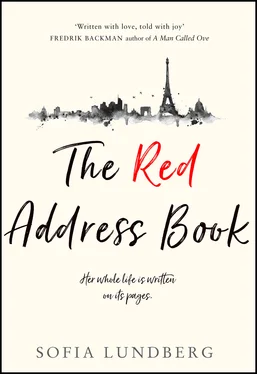It was 1928. It was my birthday, and I had just turned ten. The minute I saw the parcel, I knew it contained something special. I could tell from the twinkle in Pappa’s eyes. Those dark eyes of his, usually so preoccupied, were eagerly awaiting my reaction. The present was wrapped in thin, beautiful tissue paper. I followed its texture with my fingertips. The delicate surface, the fibres coming together in a jumble of patterns. And then the ribbon: a thick red-silk ribbon. It was the most beautiful parcel I had ever seen.
“Open, open!” Agnes, my two-year-old sister, leaned eagerly over the dining table with both arms on the tablecloth, and received a mild scolding from our mother.
“Yes, open it now!” Even my father seemed impatient.
I stroked the ribbon with my thumb before pulling both ends and untying the bow. Inside was an address book, bound in shiny red leather, which smelled sharply of dye.
“You can collect all your friends in it.” Pappa smiled. “Everyone you meet during your life. In all the exciting places you’ll visit. So you don’t forget.”
He took the book from my hand and opened it. Beneath A , he had already written his own name. Eric Alm. Plus the address and phone number for his workshop. The number, which had recently been connected, the one he was so proud of. We still didn’t have a telephone at home.
He was a big man, my father. I don’t mean physically. Not at all. But at home there never seemed to be enough room for his thoughts. He seemed to be constantly floating out over the wider world, to unknown places. I often had the feeling that he didn’t really want to be at home with us. He didn’t enjoy the small things of everyday life. He was thirsty for knowledge, and he filled our home with books. I don’t remember him talking much, not even with my mother. He just sat there with his books. Sometimes I would crawl into his lap in the armchair. He never protested, just pushed me to the side so I didn’t get in the way of the letters and images that had caught his interest. He smelled sweet, like wood, and his hair was always covered with a thin layer of sawdust, which made it look grey. His hands were rough and cracked. Every night, he would smear them with Vaseline and wear thin cotton gloves as he slept.
My hands. I held them around his neck in a cautious embrace. We sat there in our own little world. I followed his mental journey as he turned the page. He read about different countries and cultures, stuck pins into a huge map of the world that he had nailed on the wall. As though they were places he had visited. One day, he said, one day he would head out into the world. And then he added numbers to the pins. Ones, twos, and threes. He was ordering the various locations, prioritising them. Maybe he was suited to life as an explorer?
If it hadn’t been for his father’s workshop. An inheritance to look after. A duty to fulfil. He obediently went to the workshop every morning, even after Grandpa died, to stand next to an apprentice in that drab space, with stacks of boards along each wall, surrounded by the sharp scent of turpentine and mineral spirits. My sister and I were usually allowed to watch only from the doorway. Outside, white roses climbed the dark-brown wooden walls. As their petals fell to the ground, we and the neighbourhood children would collect them and place them in bowls of water; we made our own perfume to splash on our necks.
I remember stacks of half-finished tables and chairs, sawdust and wood chippings everywhere. Tools on hooks on the wall; chisels, jigsaws, carpentry knives, hammers. Everything had its rightful place. And from his position behind the woodworking bench, my father, with a pencil tucked behind one ear and a thick apron of cracked brown leather, had a view over it all. He always worked until dark, whether it was summer or winter. Then he came home. Home to his armchair.
Pappa. His soul is still here, inside me, beside me. Beneath the pile of newspapers on the chair he made, with the rush seat my mother wove. All he wanted was to venture out into the world. And all he did was leave an impression within the four walls of his home. The highly crafted statuettes, the rocking chair he made for Mamma, with its elegantly ornate details. The wooden decorations he painstakingly carved by hand. The bookshelf where some of his books still stand. My father.
Even the smallest movements require mental and physical exertion. She moves her legs forward a few millimetres and then pauses. Places her hands on the armrests. One at a time. Pause. She digs in her heels. Grips the armrest with one hand and places the other on the dining table. Sways her upper body back and forth to get some momentum. Her chair has a high, soft back support, and the legs rest in plastic cups, which raise it a few centimetres. Still, it takes her a long time to get to her feet. On the third attempt she manages it. After that, she has to stand still for another second or two, with her head bowed and both hands on the table, waiting for the dizziness to pass.
Her daily exercise. The stroll around her small apartment. Down the hallway from the kitchen, around the sofa in the living room, pausing to pick any withered leaves from the red begonia in the window. Then on to her bedroom, and her writing corner. To the laptop computer, which has become so important to her. She gingerly sits down, in yet another chair resting on plastic supports. They make the chair so high, she can barely fit her thighs beneath the desk. She lifts the lid of the computer and hears the faint, familiar whirr of the hard drive waking up. She clicks the Internet Explorer icon on the desktop, and the online version of her newspaper greets her. Every day, she is amazed by the fact that the entire world exists inside this tiny little computer. That she, a lonely woman in Stockholm, could keep in touch with people all over the world, if she wanted to. Technology fills her days. It makes waiting for death a little more bearable. She sits here every afternoon, occasionally even in the early morning or late at night, when sleep refuses to co-operate. It was her last caregiver, Maria, who taught her how it all worked. Skype, Facebook, email. Maria had said that no one was too old to learn something new. Doris agreed, and said that no one was too old to realise her dreams. Shortly after that, Maria handed in her notice so that she could resume her studies.
Ulrika doesn’t seem so interested. She has never mentioned the computer or asked what Doris is up to. She just dusts it in passing as she sweeps through the room, ticking off task after task on her to-do list. Maybe she’s on Facebook, though? Most people seem to be. Even Doris has an account, the one Maria set up for her. She also has three friends. Maria is one. Then there’s her great-niece, Jenny, in San Francisco, plus Jenny’s older son, Jack. Doris checks in with their lives every now and then, follows images and events from another world. Sometimes she even studies their friends’ lives. Those with a public profile.
Her fingers still work. They’re a little slower than they used to be, and sometimes they start to ache, forcing her to rest. She writes to gather her memories. To get an overview of the life she has lived. She hopes it will be Jenny who finds everything later, once Doris herself is dead. That it will be Jenny who reads and smiles at the pictures. Who inherits all of her beautiful things: the furniture, the paintings, the hand-painted cup. They won’t just be thrown out, will they? She shudders at the thought, brings her fingers to the keys, and starts to write, in order to clear her thoughts. Outside, white roses climbed the dark-brown wooden walls, she writes today. One sentence. Then a sense of calm as she navigates through a sea of memories.
Читать дальше












